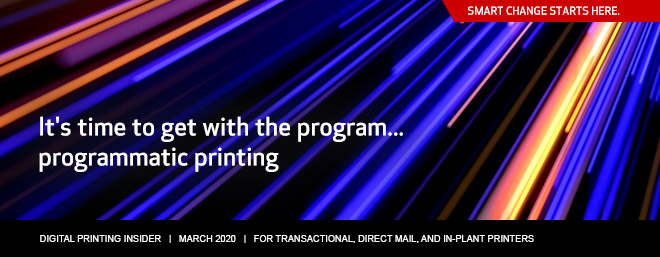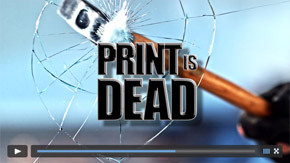Get with the Program—Understanding Programmatic Print
If you’re a digital PSP and unfamiliar with marketing automation, it’s wise to get acquainted.
Marketing automation technology works with data gathered from a brand’s customer relationship management (CRM) platform to automate actions at different points in the customer life cycle—for example, triggering a marketing email when a prospect visits a website.
Such platforms are now the norm, powered by our browsing patterns, social media activity, and purchasing behavior. Every interaction tells brands more about us. They can use this information to make the next interaction more personal, more relevant, all in real time.
There’s definitely a place for digital print in this automated marketing world because of print’s many advantages as a promotional medium.
While consumers are losing trust in digital media, and brands are fighting the digital noise for our attention, print stands out for its tangible and emotional impact as well as the greater faith consumers place in it.
A question of timing: picking the “moment of high intent”
But in a world of “real-time” marketing, the strongest perceived argument against print is that it’s not instantaneous. It has to be designed, approved, printed, and distributed.
Programmatic Print solves this by integrating marketing automation platforms with a highly automated print production workflow.
So how does it work, and what are the benefits?
The concept is closely related to programmatic marketing and programmatic mail.
Programmatic marketing involves automated real-time bidding for the chance to show an online advertisement to a single customer at a specific moment in time. For example, those pop-up ads that “magically” reflect what we’re looking at online.
With programmatic mail, when a customer triggers an interaction online, in addition to the usual email, video, or pop-up, they also receive a targeted piece of high-quality printed direct mail. This can happen within 24 hours, so there’s no loss of momentum.
Programmatic Print is the next level of print marketing automation. It can create and deliver the full range of promotional print—brochures, catalogs, magalogs, customer magazines, brand books, customer newsletters—almost in real time. This gives marketers the best of both worlds—data-driven targeted propositions with the emotional appeal of high-quality print.
Up-to-date customer information is used to generate a personalized print file for automated digital printing. Marketing materials printed on a one-to-one ratio become cost-efficient for campaigns of any scale.
Programmatic Print takes advantage of “the time of high intent,” the moment in a customer journey when engagement—with a product, service, or brand—reaches a tipping point.
Here’s an example: a carmaker’s website lets you choose what paint and upholstery colors you want. The next morning your mail includes a personalized product brochure showing the car in the colors you chose, with an appointment for a test drive. The chances of you engaging deeply with this content are considerably higher than with an email, which might hold your attention for about eight seconds.
And Programmatic Print is a great solution for “abandoned basket syndrome.” According to research, UK retailers lose up to £1 billion ($1.3 billion) in sales each year because 69% of online baskets are left before checkout.
One clever fashion retailer decided to tackle this using print while testing digital marketing at the same time. The online approach involved sending customers two emails, backed up by banner ads. The print solution added a piece of direct mail, including a photo of the items in the abandoned basket.
The results were eye-opening. While ad blockers reduced the effectiveness of the banner ads, the direct mail hit home. Response rate rose 6%, average order value increased by 8%, and the abandoned basket rate fell by 14%.
Winning work with Programmatic Print
For a print business, Programmatic Print has the potential to transform how you win work, because you become part of the marketing automation ecosystem. At chosen touchpoints in a customer’s online travels, print is selected as the most appropriate channel and the work enters your workflow automatically.
The marketing automation system sells for you, though what it sells might be different from what you printed before. Instead of a single print run of 2,000 for one customer, you may print ten jobs for different customers, each with a run of 200. The same 2,000 volume, but made up differently.
Brand owners can choose from dozens of marketing automation tools, but they’re all fundamentally designed to integrate with other solutions—and that includes digital print.
So while integrating your production system with a marketing automation tool may not be as easy as “plug and play,” it’s probably more straightforward than you think. And if you have automated workflow and production in place, Programmatic Print is within your grasp.
If not, you can take some initial steps, starting with learning about marketing automation using information from the specialist software suppliers and online.
Next, explore the situation with your own customers:
- Do they have a CRM system and what do they use it for?
- If they’re gathering customer information, are they making the best use of it?
- Have they invested in marketing automation? If so, what solutions do they have?
You also need to ask questions of yourself:
- How ready are we to move into Programmatic Print?
- Are our current systems automated enough?
- If not, what steps do we need to take?
- Which customers are suited to Programmatic Printing?
Once you understand how your customers use marketing automation and have assessed your potential to provide these services, it’s time to involve your technology solutions provider about optimizing your systems and moving your plan forward.
The right partner will work with you to put the tools in place, then facilitate the conversation with your customers to spotlight Programmatic Print opportunities and turn their and your vision into a reality.
When you combine technical capability with a creative approach to meeting your customers’ marketing objectives, you’ll be able to deliver personalized promotional print that really stands out.
READ THE WHITE PAPER

